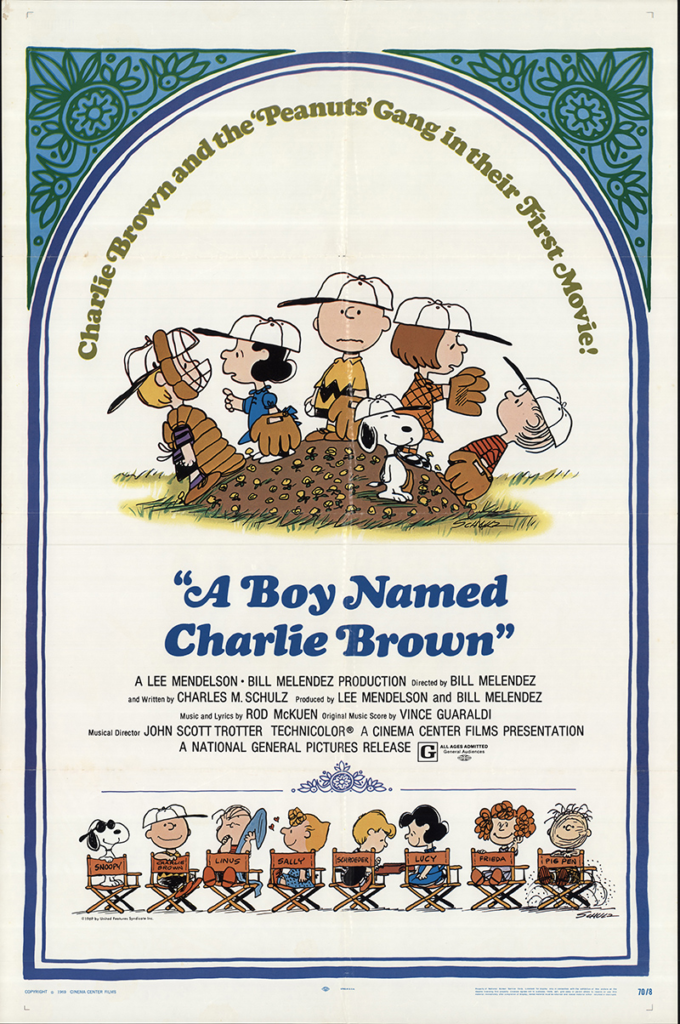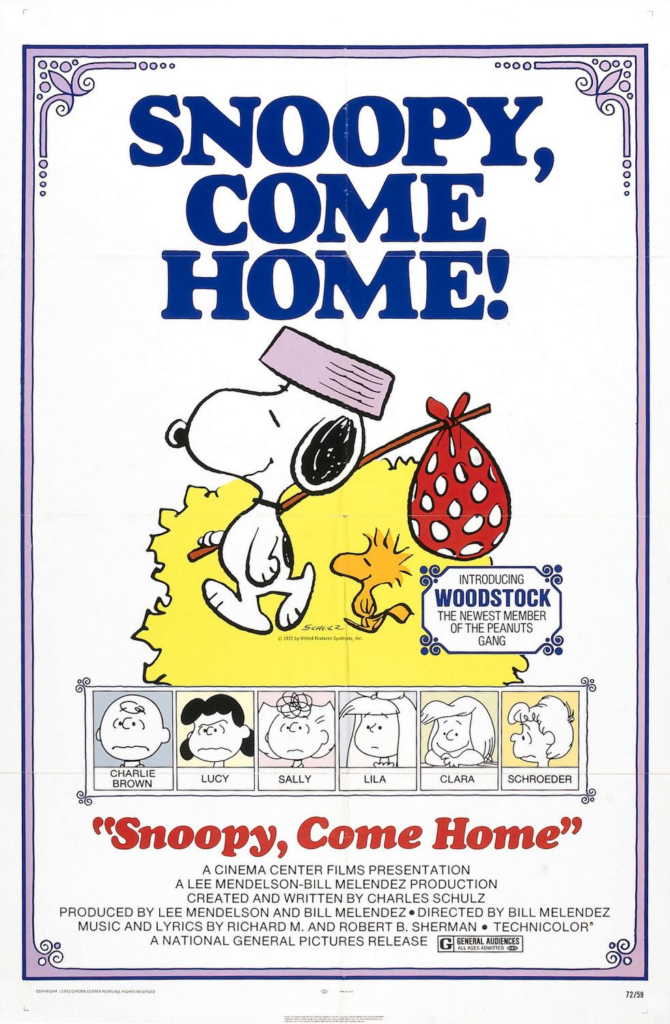In the past, I’ve lamented on this blog that of all the Peanuts specials, only A Charlie Brown Christmas and It’s the Great Pumpkin, Charlie Brown are beloved when there are so many others just as great or greater to my mind. The five full length Peanuts animated movies to be released in cinemas have arguably suffered an even sadder fate. None of them is really well known outside the Peanuts fandom. Of course, the person writing this has a hard time comprehending the mindset of anyone outside that fandom. But with the court’s permission, I’m going to make the case that you should consider checking out at least a few of these films.
Something to Make the Fourth Column Headlines: A Boy Named Charlie Brown (1969)

The 1960s were when Peanuts was arguably at the peak of its popularity. It must have been a thrill for fans to see their favorite characters on the silver screen, doing what they did best and at the exact point in Peanuts animation history when most of the best voice actors for those characters were available. The script by series creator Charles Schulz works in just about all of the most famous Peanuts tropes. We get Charlie Brown (voiced by Peter Robbins for the last time) failing to fly a kite, he and his hapless baseball team losing a game, Snoopy (director Bill Melendez)’s suppertime dance, Snoopy imagining himself as a World War I flying ace, Lucy (Pamelyn Ferdin)’s psychiatry booth, Linus (Glenn Gilger)’s security blanket addiction and more. But the movie does more than reproduce what fans had already seen in the comics and in the five television specials that had been made at this point. It goes much bigger. There are several nifty visual flourishes that were new for the franchise.[1]That’s an ugly word, franchise, but an accurate one.

There are even a few Fantasia-esque psychedelic scenes, most notably for when the gang plays the American national anthem before their baseball game and for Schroeder (Andy Pforsich)’s performance of Beethoven’s Pathetique Sonata.[2]Ingolf Dahl did the actual performance.


There’s also a fantasy sequence of Snoopy at an ice rink, imagining himself as alternatively a world-famous hockey player or a world-famous figure skater, which isn’t as pretty but is a lot of fun.

At a first glance, the backgrounds for the “normal” scenes are rather nondescript in keeping with the deceptively simple art style of Peanuts. But at a second glance, they have a subtle beauty lacking in the backgrounds for the specials that came before them.

The academy award nominated musical score by Vince Guaraldi and John Scott Trotter is an overlooked gem. Most of it is highly pleasant and laidback, in keeping with the movie’s relaxed pacing, but it also packs a punch in the emotional moments, in keeping with the story’s melancholy themes. Not as much use is made of Guaraldi’s classic Linus and Lucy theme as I might have expected or preferred but when it’s used, it’s used well, mostly notably for a joyously silly cathartic moment near the climax. I’m not familiar with songwriter Rod McKuen but maybe that should change because the three songs he contributed to this movie are wonderful. All of them look at the title character from a different angle. Failure Face savagely mocks him for his incompetence. Champion Charlie Brown celebrates him for a rare victory. And the film’s title song celebrates him for simply being a likeable everyman character. There’s also a song about spelling, I Before E, by John Scott Trotter, which doesn’t fit into the pattern but is still fun.

Some fussy viewers/critics may object that this movie feels like a collection of related jokes from the comics. But that’s the part of the movie’s appeal for me, especially since they’re such hilarious jokes. I’d argue it’s perfectly right for adapting the comic to a new medium for the first time and I’d argue the movie does have a story, just one that it takes time to set up. It also takes its time to set up punchlines, something that is also part of its appeal for me. I consider Phineas and Ferb, a more modern cartoon about which I recently blogged, and its typically modern two-jokes-a-minute pacing to be brilliant. But rewatching A Boy Named Charlie Brown after rewatching a bunch of Phineas and Ferb episodes, I was struck by how refreshing it was to have to wait for the laughs, especially since they were so big when they came. This movie trusts its characters charm enough to relax and spend time with them without the need for everything to get an immediate laugh or further the plot somehow. I pity any unsophisticated modern kids who find this a turnoff.
But I was supposed to be explaining that plot, wasn’t I? Well, after a leisurely first act that sets up Charlie Brown’s character, the movie adapts a 1966 storyline from the comic strip about him entering a spelling bee, but it takes this storyline in a much more dramatic direction with much higher stakes than the Peanuts norm.


As you may have gathered, the story centers around Charlie Brown, probably the most emotionally compelling Peanuts character, and his many failures. It’s probably the most piercing exploration of him in any bit of Peanuts media. Linus also plays a major role, trying to encourage Charlie Brown. Throughout most of the movie, his maxims, such as “winning isn’t everything” and “we learn more from losing than we do from winning” provide Charlie Brown with no comfort and even make him feel worse by putting pressure on him. (Lucy meanwhile deliberately discourages him with a hilariously cruel “therapy session” and later latches onto him for nakedly selfish reasons.) But Linus’s final line, while it might sound equally trite out of context, proves to be just what the old blockhead needs and is the character’s finest moment since the climax of A Charlie Brown Christmas.

A Funky Sparkling Wonderland: Snoopy Come Home (1972)

The second Peanuts movie is almost as great as the first. I’m not sure why I don’t consider the two movies equal. Maybe it’s because this one focuses on the second-best candidate for the franchise’s main character rather than the first.[3]I’d argue that the comic strip didn’t really have a main character but never mind that. Don’t get me wrong. Snoopy is a great character. While the animated version lacks the sarcastic wit of the comic strip character’s “thought balloons,” his adorable design could have been made for animation and Bill Melendez’s squeaky growls and guffaws bring him wonderfully to life. Yet while Snoopy Come Home has some big laughs, it’s not really the funniest Snoopy vehicle. He and Woodstock had finer hours in specials and movies where they had smaller roles.

Ah, yes, Woodstock. This movie was the little yellow bird’s big screen debut and he’s a welcome presence in it. Despite what I said in the previous paragraph, he and Snoopy are still great fun to watch here. They remind me a bit of Shawn Spencer and Burton Guster from USA’s Psych. (Snoopy is Shawn and Woodstock Gus.)

Peppermint Patty (Christopher DeFaria) had more screentime than Woodstock in A Boy Named Charlie Brown in that she appeared in the background while having no dialogue. Here she gets a major role. Well, for the first two thirds of the movie or so. She oddly vanishes for the last part, only appearing in the background of one shot toward the end. You could argue she doesn’t really fit in the story and only exists to pad it out. Still, she makes for entertaining padding, mainly her disastrous date at a carnival with Charlie Brown (Chad Weber) which goes to show that they really aren’t suited to be a couple.

The film’s plot is set in motion by Snoopy mysteriously receiving a letter from a girl named Lila (Johanna Baer) saying that she’s in the hospital and asking him to visit her. Snoopy runs off in a state of agitation, leaving his owner and neighbors bewildered. Fans who had been following the comics would already know Lila’s identity, this being adapted from a storyline that ran in newspapers four years prior. Personally, I’m thankful I hadn’t read it before I saw the movie because it’s a great mystery and the movie takes things in a much more dramatic direction than the comic did.

Snoopy Come Home‘s score was composed by Don Ralke, making it the first bit of Peanuts animation, I believe, not to feature Vince Guaraldi, and its musical numbers were written by Richard M. and Robert B. Sherman who were responsible for just about every cinematic children’s musical during the 60s and 70s. (They’re most well known for their work on Mary Poppins and The Many Adventures of Winnie-the-Pooh.) I’d argue that the Shermans were more notable for their quantity than their consistent quality, but all of their songs for this movie, both the cheery and the tearful ones, rank among their best work.

There certainly are occasions for sad songs in this movie, which is kind of infamous among the Peanuts fandom for its sadness. Before Snoopy’s departure, he’s shown to get in conflicts with Charlie Brown, Peppermint Patty, Linus (Stephen Shea) and Lucy (Robin Kohn), ones in which both parties are at fault.[4]Well, except in Peppermint Patty’s case where neither is at fault and the whole thing is a misunderstanding, making it arguably even sadder. After he leaves, they all miss him and blame themselves for pushing him away. Charles Schulz had just gone through a messy divorce[5]Aren’t they all? and the script he wrote arguably reflects that. When Linus lets go of his security blanket a couple of times, you know things are serious.
But this movie also features scenes as amusing as anything in Peanuts, such as Snoopy and Woodstock’s encounter with a girl named Clara (Linda Ercoli) who tries to adopt them against their will. Clara had appeared in the comic strip before, but this movie revealed just how hilarious she could be. It also has the most heartwarming emotional finale to any Peanuts movie. Part of me really wishes it wouldn’t proceed to comedically undermine said finale. But too many of the recent Peanuts specials that Apple has produced have focused too much on trying to be heartwarming and not enough on trying to be witty or to capture the spirit of the comic. By contrast, there’s something refreshing or at least appropriate feeling about the cynical humor of Snoopy Come Home‘s final moments.

Next Time: Charlie Brown Goes on a Treacherous River Raft Race and Becomes a Foreign Exchange Student to France. AAAUGHH!
References
| ↑1 | That’s an ugly word, franchise, but an accurate one. |
|---|---|
| ↑2 | Ingolf Dahl did the actual performance. |
| ↑3 | I’d argue that the comic strip didn’t really have a main character but never mind that. |
| ↑4 | Well, except in Peppermint Patty’s case where neither is at fault and the whole thing is a misunderstanding, making it arguably even sadder. |
| ↑5 | Aren’t they all? |
